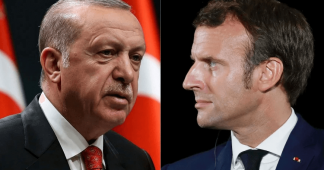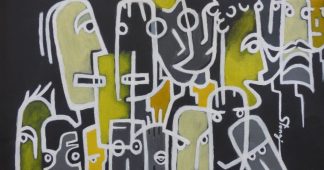To continue his neoliberal project beyond 2022, Macron is wooing France’s right-wing base. But this strategy could end up putting Le Pen in power
By
Apr. 6, 2021
After the brutal murder of the teacher Samuel Paty last year, the compatibility of Islam with the values of French democracy is still widely discussed in the country these days. Recently, the debate has taken a new turn: it now centres around the supposed existence of what was formerly a fringe, far-right idea: the so-called ‘Islamo-gauchisme’, an alleged alliance between leftists and Islamists among academics and students at French universities representing a threat to the French Republic.
Perhaps surprisingly, the concept has entered the mainstream after French President Emmanuel Macron, his party and ministers adopted it – and used it to propose sweeping changes to civil liberties in a so-called ‘anti-separatism law’. In fact, however, Macron’s reaction is not at all surprising. It should be obvious to anyone now that the French president’s political project is a right-wing, neoliberal one. And with the polls narrowing between him and Marine Le Pen in a potential run-off in the 2022 presidential election, Macron’s strategy relies on winning over the right-wing social base that would support his project.
In contrast, Macron’s victory in 2017 was widely perceived as overcoming the left-right cleavage that had traditionally structured political competition in France since the beginning of the Fifth Republic. Presenting his political project as both left and right, Macron had been able to gather some electoral support from the Socialist Party (PS) electorate as well as a fraction of conservative voters.
The run-off with Marine Le Pen seemed to indicate the emergence of a new divide between ‘populists’ and progressives. Macron’s political project was to unite the better-off and educated social groups on the Left and Right into a new social bloc that Stefano Palombarini and myself have called the bourgeois bloc.
Expanding the bourgeois bloc
Macron promised a programme of neoliberal ‘structural reforms’, supposedly boosting growth and alleviating unemployment, while advancing European integration. At the same time, Macron held a progressive discourse on individual rights and societal values. Benefitting from the rupture of the traditional left and right social blocs, Maron succeeded in aggregating the bourgeois bloc and won the presidential and legislative elections.
But the bourgeois bloc is just a small part of the electorate. Its core – the upper and upper-middle classes – has been expanded to the broader middle class thanks to economic (growth through structural reforms) as well as societal promises. But the structural reforms – the implementation of a series of measures that would radically transform the French socioeconomic model – is Macron’s real objective. In order for it to succeed, he needs to broaden his social base beyond the bourgeois bloc. And the only groups likely to support Macron and his neoliberal reform programme belong to the former right-wing bloc, as they don’t care so much about his vague promises regarding liberal social values.
Besides, Macron’s neoliberal reform programme – concerning labour law, unemployment benefits, pensions, privatisations and so on – is rather drastic and has important consequences for income and status inequalities. This has led to a substantial social opposition: in November 2018, the Gilets jaunes movement rose up and has kept on protesting to this date (albeit in a more discreet fashion). Considering Macron’s rather narrow social base, such protests could only be dealt with through a rather brutal police repression and by restricting civil liberties. Macron can therefore no longer be considered neither left nor right. Both in terms of economic policies and societal values, his programme is, by necessity, firmly anchored on the Right because this is where the social base for his reform programme lies.
These developments put an end to the fiction of a new divide between populists and progressives. Nevertheless, Macron cannot position himself as the new leader of the Right and rely solely on the support of their traditional social base. One reason is the existence of a political competition on the right. Conservative parties such as Les Républicains (LR) have been negatively affected by the rise of Macron, but they have not yet collapsed. Besides, Marine Le Pen’s Rassemblement National (RN), which has a solid electoral base, is also making moves towards conservative respectability. Moreover, a fraction of the traditional right-wing social base belong to the popular classes, which still value the French social model and have no strong inclination towards Macron’s neoliberal reform programme.
Macron’s strategy for 2022
So Macron is attempting to aggregate a renewed right-wing bloc with a two-pronged strategy. Firstly, the pursuit of the neoliberal structural reforms is likely to alienate a small part of the left-wing middle classes that had joined the bourgeois bloc in 2017. More importantly, however, it is bound to win over the traditional upper and middle classes that had previously backed the traditional conservative parties in the hope of a Thatcherian transformation of the French model. When one compares the reforms made by Macron (and Hollande) to what the right-wing governments have done in the past four decades, it is more than obvious that Macron has been and will be far more neoliberal than any of these governments.
Secondly, Macron’s and his party’s promotion of various identity-based societal issues in the public debate – such as the so-called Islamo-gauchisme – is instrumental in the consolidation on the right of the bourgeois bloc. It contributes to blurring the lines between ‘government parties’ such as LREM or LR and Le Pen’s RN, and defining a political space firmly located on the right.
The promotion of identity issues in the media helps to conceal the most controversial aspects of the economic reform programme, and thus defuse social opposition. The danger is, however, that this strategy legitimises Le Pen and makes Macron compete with her for a similar electorate. Macron seems to believe that Le Pen’s incompetence will prevent her from winning the presidential election in 2022. However, this is all but guaranteed. Recent polls show head-to-head race between Le Pen and Macron in the first round, while some show Macron inching to victory in the second round by a mere 4 per cent margin.
What can the Left do?
Does this situation leave space for a left-wing initiative? The emergence of the bourgeois bloc has probably ruptured the traditional left bloc for good, and has lost them part of the skilled middle classes. A left political strategy can only try to aggregate a renewed social bloc with a political programme that differs rather drastically from what the PS has put forward until 2017.
A political debate hinging on concrete material issues – and a political party able to propose a programmatic alternative to the pursuit of neoliberal reforms – could aim to aggregate a revitalised left-wing bloc.
That’s why the Left would benefit from refocussing the public debate on economic structural issues (the neoliberal transformation of the French socio-economic model) and away from identity, race, or religious issues. There is, after all, a social majority in favour of the institutions that Macron’s programme aims to dismantle: public education, social protection and public healthcare.
Published at www.ips-journal.eu











